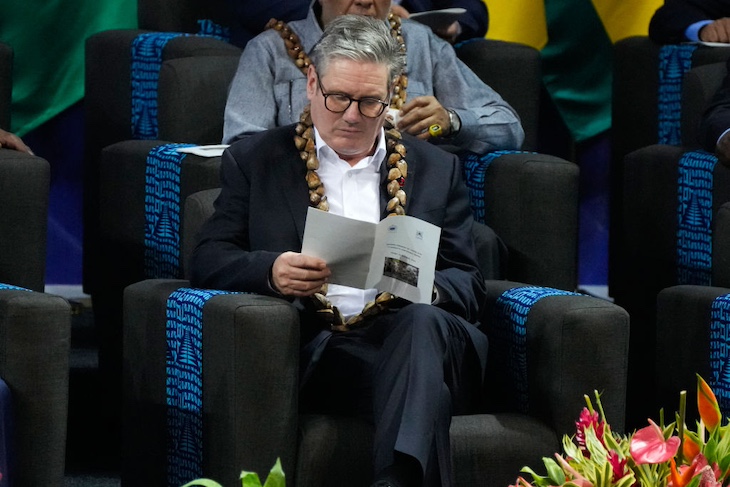
Ahead of the Commonwealth summit in Samoa, Keir Starmer told the travelling press pack that he wanted to look forward rather than have ‘very long endless discussions about reparations on the past.’ Rather than discuss the possibility of payments to Commonwealth countries to apologise for Britain’s historical role in the slave trade, Starmer wanted to talk about areas of collaboration on climate and humanitarian work. By his own metric, the Prime Minister appears to have failed.
While government figures repeatedly said reparation talks were not on the table, Starmer leaves Samoa having agreed with Commonwealth countries that Britain will discuss reparations for slavery next year. Despite opposition from the UK government, the 56 Commonwealth countries pressed on. The official communique marking the end of the conference includes a paragraph on ‘reparatory justice’. The document was published later than expected – in part this is being blamed (which Downing Street denies) on discussions about the wording on reparations. The passage was watered down slightly but still paves the way for future talks:
‘Heads, noting calls for discussions on reparatory justice with regard to the transatlantic trade in enslaved Africans and chattel enslavement and recognising the importance of this matter to member states of the Commonwealth… agreed that the time has come for a meaningful, truthful and respectful conversation towards forging a common future based on equity.’
Now a ‘meaningful, truthful and respectful’ conversation isn’t the same as saying the UK will have to give Commonwealth countries payments running to billions (even trillions) to apologise for Britain’s role in the slave trade. But it could be a stepping stone to a conversation on payments, no matter what the current position of the government is. The new secretary-general of the Commonwealth, Shirley Botchwey, has said ‘financial reparations are good’.
The next opportunity for talks on the issue is the UK-Caribbean forum next year. The issue is also expected to be a focus of the Commonwealth summit in two years’ time – with a UN judge suggesting the UK owes over £18 trillion in reparations to 14 Caribbean countries.
Speaking after the communique was published, Starmer tried to play down its significance. He said it was worth noting that ‘in the two days we’ve been here, none of the discussions have been about money. Our position is very, very clear.’ While there are some Labour figures on the backbench that believe Starmer should adopt a softer position on reparations, the government line is that this is not something the UK can afford to get into.
But that raises the question: given the UK was so clearly against reparation talks going into the summit, how did Starmer find himself in a position where the Commonwealth countries pushed him into it anyway? Already there is some anonymous briefing from the government about the UK pursuing other forms of reparatory justice, such as debt relief. The risk is that the communique now provides a basis for further work on the issue as expectations rise that payments are down the line.

